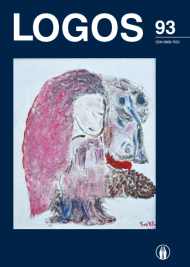Egzistencinio teizmo ir ateizmo tiesos perskyra: J. Girniaus ir A. Maceinos perspektyva
Dividing the Truth of Existential Theism and Atheism: The Perspective of J. Girnius and A. Maceina
Author(s): Tomas KavaliauskasSubject(s): Christian Theology and Religion, Contemporary Philosophy, Pragmatism, Philosophy of Religion
Published by: Visuomeninė organizacija »LOGOS«
Keywords: J. Girnius; God; Being; theism; atheism; philosophy; A. Maceina; existential complaint;
Summary/Abstract: The article analyses J. Girnius’s religious philosophy in which he divides the truth of theism and atheism. The former claims God’s existence, the latter negates it. The author of the article calls the reader’s attention to the fact that the truth of theism of God as existing is abstract, void of cultural and social reality, because there are so many different denominations of various Christian churches, Protestants and Catholics share different approaches to the meanings of the Bible and teaching of Jesus. For this reason the article mentions the letter of tolerance by John Locke, whose liberal civic ideas wanted to defend citizens from true-believers of various denominations when religion was used as an instrument for political interests and power. The other parts of the article are devoted to the analyses of A. Maceina’s concept of existential complaint, which for him is a proof of the human’s religious nature. When a human is suffering s/he is complaining. And when fellow humans cannot provide a reason, s/he is complaining ultimately to God. Maceina interprets the story of Job from the old testament in order to prove the religious meaning of existential complaint as superior to Heidegger’s existential Sorge. The article concludes that for a possible reconciliation of the divided truth of theism and atheism we should look into the philosophy of W. James’ pragmatism and R. Rorty’s neopragmatism.
Journal: LOGOS - A Journal of Religion, Philosophy, Comparative Cultural Studies and Art
- Issue Year: 2017
- Issue No: 93
- Page Range: 85-97
- Page Count: 13
- Language: Lithuanian

